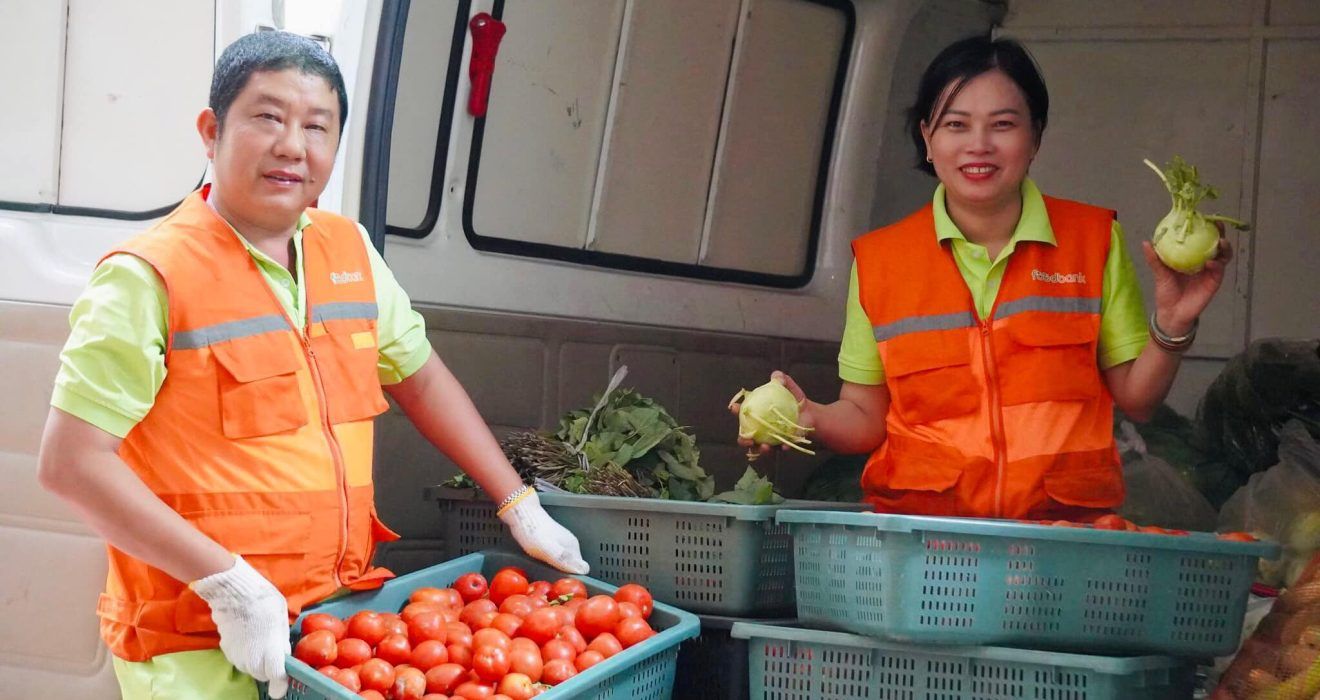Food Bank Vietnam is an organization dedicated to promoting sustainability within the agricultural and food value chain, contributing to food security and advancing towards green-oriented sustainable development. In addition, Food Bank Vietnam also encourages community food initiatives and engages in long-term activities to combat food waste.
Our Vision and Persistent Efforts
Founded in 2016, the Vietnam Food Bank Network has developed diverse models tailored to each locality. Currently, it operates across 44 provinces and cities, with expansions in 11 provinces/cities: Ho Chi Minh City, Hanoi, Ben Tre, Da Nang, Quang Binh, Quang Ngai, Kien Giang, Thanh Hoa, Hung Yen, Kon Tum, and Son La.
Food Bank Vietnam began with a simple yet profound vision: to create a world where no one goes hungry and no food goes to waste. Founded on the principles of empathy and sustainability, the organization embarked on a relentless journey to address the critical issues of food insecurity and food wastage in the country.
The early days were filled with challenges, from raising awareness about food waste to establishing a reliable network for food collection and distribution. However, through unwavering dedication and strategic partnerships, Food Bank Vietnam grew into a robust system that not only rescues surplus food but also supports those in dire need. Today, it operates a system of projects aimed at creating a sustainable food ecosystem.

When Surplus Food Takes On A Greater Meaning
One of the flagship initiatives of Food Bank Vietnam is the “Food Recovery & For A Green Tomorrow Project”. These programs focus on reclaiming surplus food from various sources such as restaurants, retail food stores, wholesale markets, and farms, ensuring that perfectly edible food is redirected to those in need instead of ending up in landfills. By doing so, the project not only combats hunger but also significantly reduces the environmental impact of food waste and loss.
Recently, many activities of these periodic projects contributed significantly to preventing the dumping of tons of food every day but also creates a diverse source of food to support community centers, charitable kitchens, and other organizations. Food Bank volunteers participate in collecting, sorting, and distributing food, especially fruits and vegetables, to shelters regularly with tons of food items.
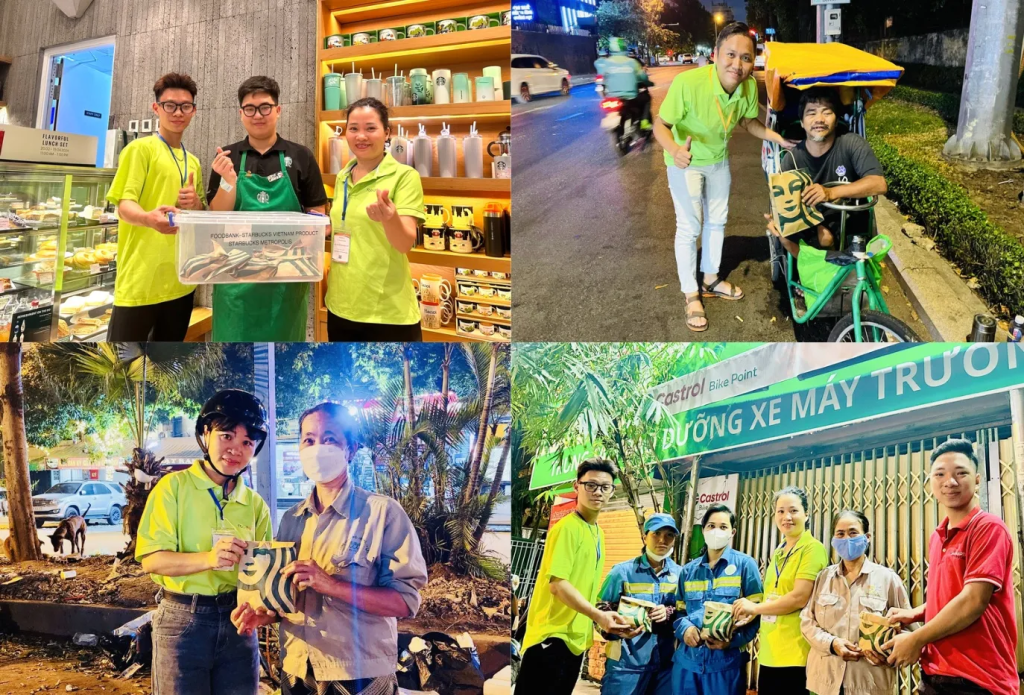
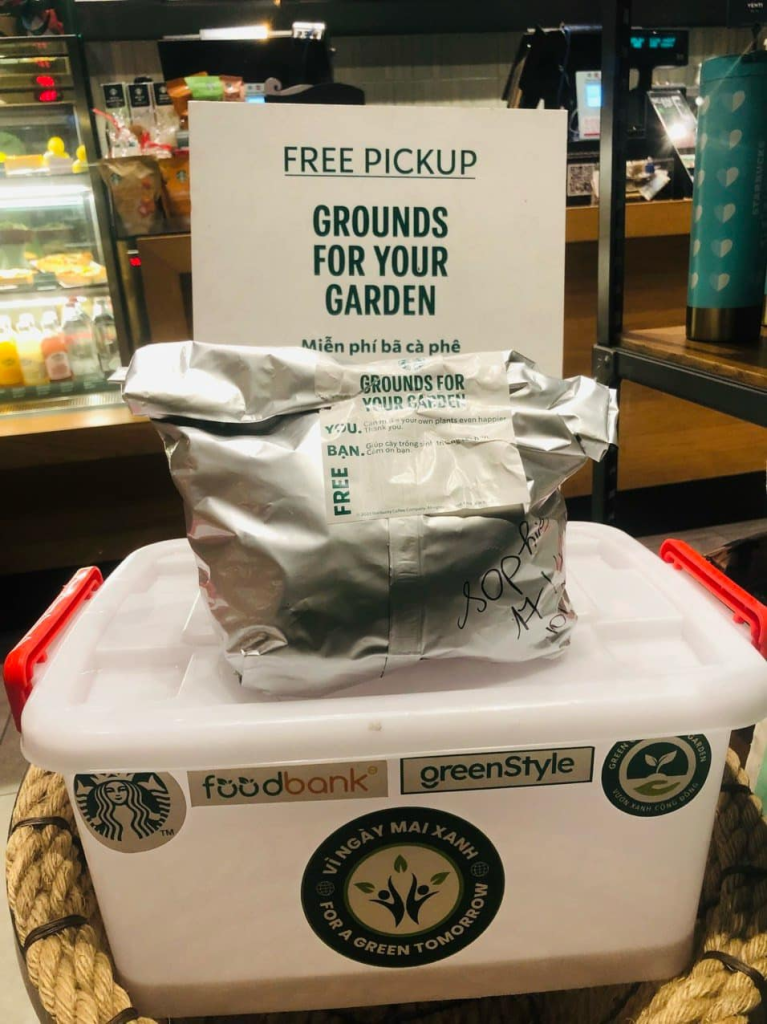
This is a meaningful job for people in difficult circumstances and brings many benefits at the same time. The first is to prevent food waste. Any type of food a business produces wants to be consumed, but there will be times when commercial activities are not as expected. Hence, Food Bank Vietnam will take on the role of raising awareness and preventing food waste with a series of green activities – distributing and sharing ingredients and food products from manufacturers, or food stores,… to our beneficiary unit network such as open shelters, nursing homes, or to individuals who need food. At the same time, besides Starbucks as a strategic partner, many enterprises also coordinate closely with Food Bank Vietnam to provide a system of solutions to minimize food loss and waste in the process of producing and serving.
Ms, Nguyen Hoang Truc Linh (Jolie Nguyen) – CEO of Food Bank Vietnam stated.
This initiative is a cornerstone of Food Bank Vietnam’s efforts to promote sustainability. It underscores the importance of resource optimization and the potential for community engagement in creating a greener future. The project has successfully mobilized volunteers and partners across the country, fostering a collective movement towards food recovery and environmental responsibility.
Supporting Farmers in Consuming Agricultural Products and Stabilizing Market Prices
The “Farm to Food Bank” project is an innovative initiative by Food Bank Vietnam, aimed at bridging the gap between agricultural surplus and food scarcity. This project is designed to tackle several pressing challenges in the food supply chain, including reducing food waste, supporting farmers, and enhancing food security for underprivileged communities.
At its core, the “Farm to Food Bank” project focuses on rescuing surplus agricultural products that are at risk of going to waste due to various reasons such as market oversupply, cosmetic imperfections, or logistical constraints. By connecting directly with farmers, the project ensures that these perfectly edible and nutritious foods are harvested and directed away from landfills towards those in need. In the near future, a series of programs about education for farmers on sustainable farming practices, food preservation, and waste reduction techniques will be implemented by Food Bank Vietnam network to enhance their productivity and sustainability.
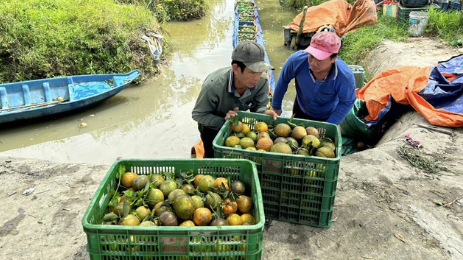

Last year, a salient example called “The program to consume ripe oranges – joining hands to support farmers”, has collected more than 200 tons of oranges and were being sold on mobile vehicles in Ho Chi Minh City. The purchase price at the garden is 6,000 VND/kg and the selling price of the product to the market is 10,000 VND/kg. Revenue from selling oranges is used to continue buying oranges from farmers in other localities that are congested. In addition, the Project also distributes and sends to more than 100 shelters, open houses, and nursing homes in the beneficiary network of Food Bank Vietnam.
This initiative not only provides a reliable source of food for the hungry but also offers financial stability to farmers, helping to stabilize prices and create a more resilient agricultural sector. The project embodies a win-win target where food security and agricultural sustainability can go hand in hand.
The First Foodbank Garden Model in Vietnam – Contributing to Greening the Food Supply Chain & Reducing CO2 Emissions
A recent and highly impactful addition to Food Bank Vietnam’s suite of projects is the Foodbank Garden model. This innovative approach aims to directly address food insecurity by cultivating a variety of fresh produce for distribution to food banks and shelters. The gardens are designed to supply a steady stream of nutritious fruits and vegetables to those in need, ensuring a healthy diet for families and individuals facing hardship.

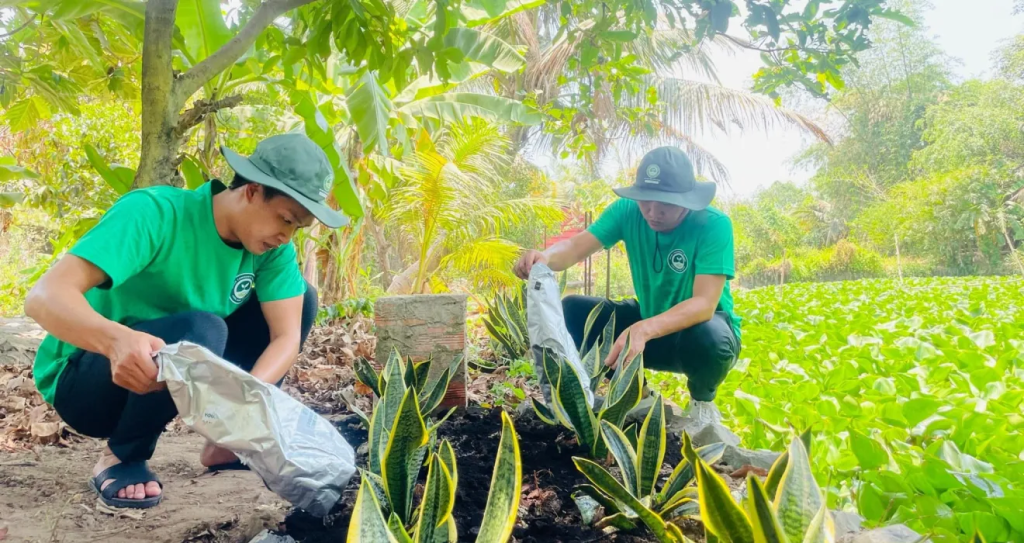
Beyond food provision, the Foodbank Garden model incorporates a sustainable loop by utilizing food waste from local retailers and restaurants to create organic fertilizer or animal feed. This practice significantly reduces CO2 emissions, contributing to environmental protection.
The program has coordinated with large chains of coffee shops in the Ho Chi Minh City area to collect tea grounds, coffee grounds, and organic foods to provide nutrition for plants and animals. This model aims to provide clean and nutritious food sources for users to access high quality food sources, reducing the risk of exposure to toxic chemicals. At the same time, it helps improve air quality, reduce CO2 in sustainable food systems, especially contributing to reducing more than 30 million kg of CO2 emissions.
The Community Foodbank Garden model is one of the outstanding models of green transformation in the world and in Vietnam. We founded and developed this model in the direction of green development and sustainable green transformation in the food system.
Mr. Nguyen Tuan Khoi – Chairman of Food Bank Vietnam informed.
The initiative also emphasizes community involvement and education. By engaging local community members, schools, and universities in the cultivation and distribution processes, Food Bank Vietnam fosters community bonds and raises awareness about food security. Educational programs and workshops empower individuals with the skills to grow their own food and support their communities, promoting a culture of sustainability and self-reliance. We also find Vietnam has many opportunities to develop community Foodbank Garden model, especially in the context that many people and student’s majors are increasingly interested in clean and safe food.

The projects spearheaded by Food Bank Vietnam represent a comprehensive approach to tackling food waste and food insecurity while promoting environmental sustainability and community resilience. These initiatives extend far beyond mere food provision; they cultivate a culture of care, education, and shared responsibility. Therefore, we are honored to lead these transformative efforts, showcasing that the mission is indeed “More than Food” – it’s about building a healthier, more sustainable, and inclusive society for all.
Food Bank Vietnam.

